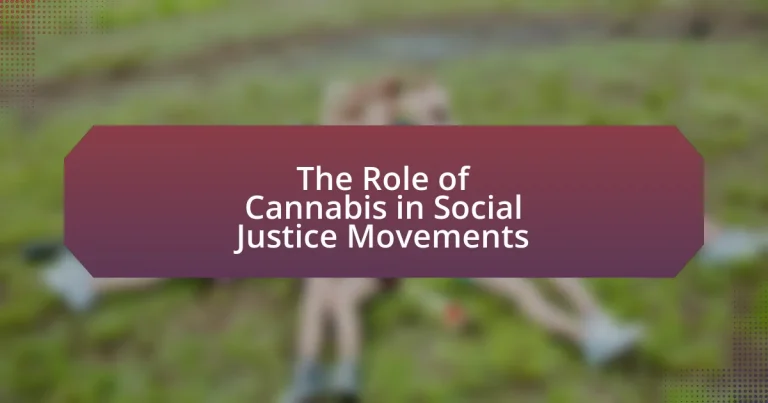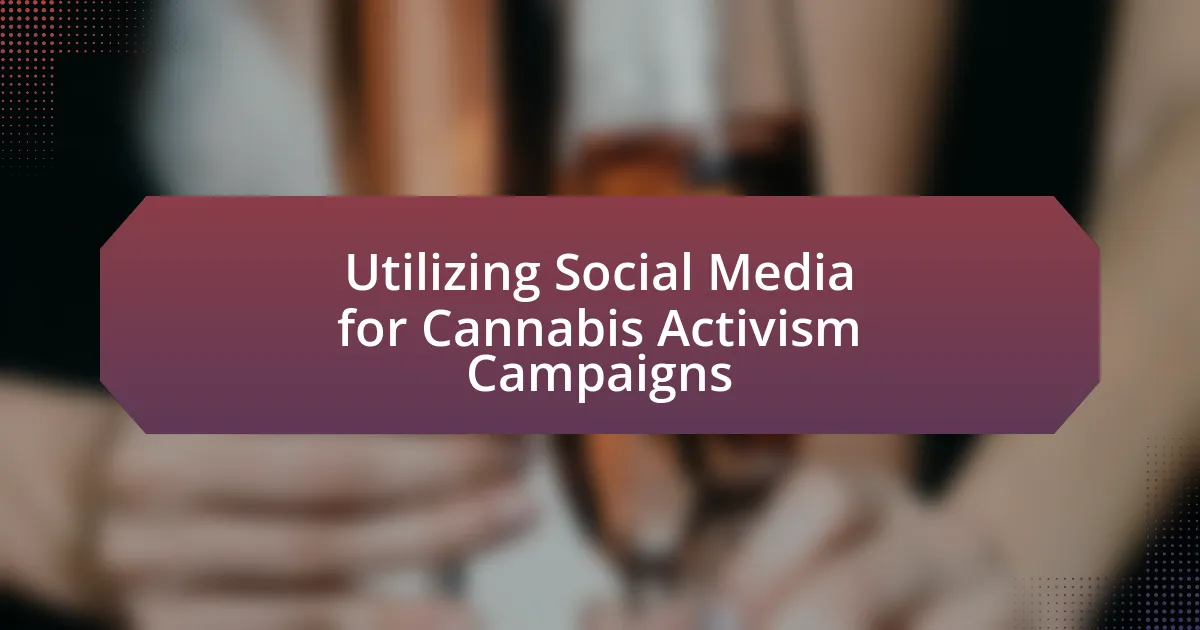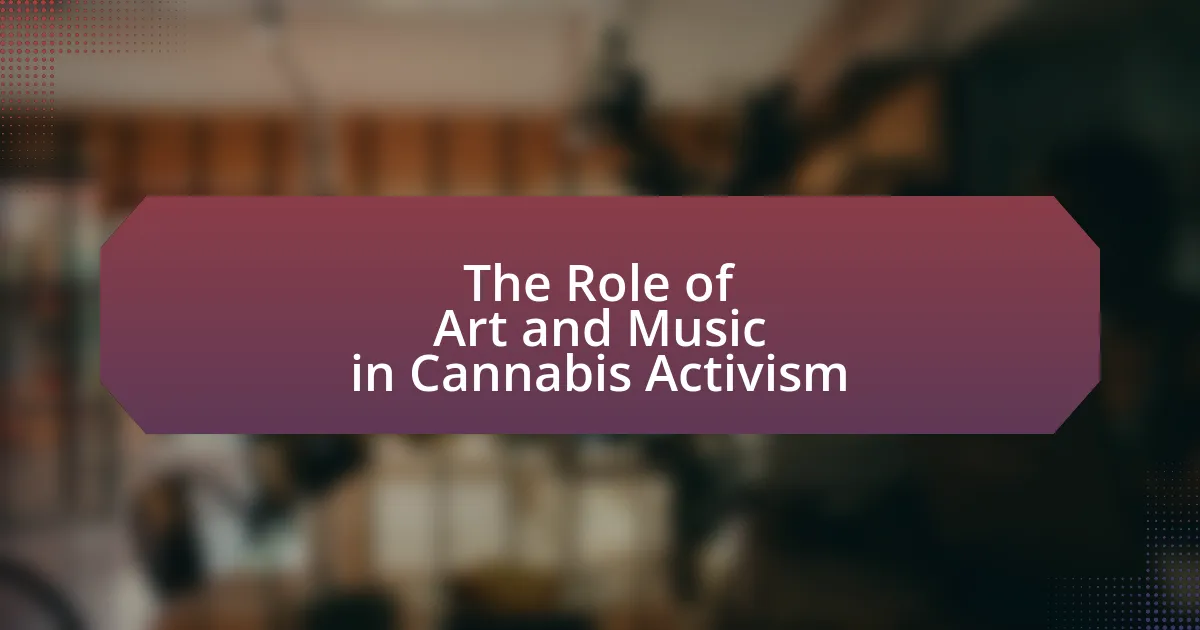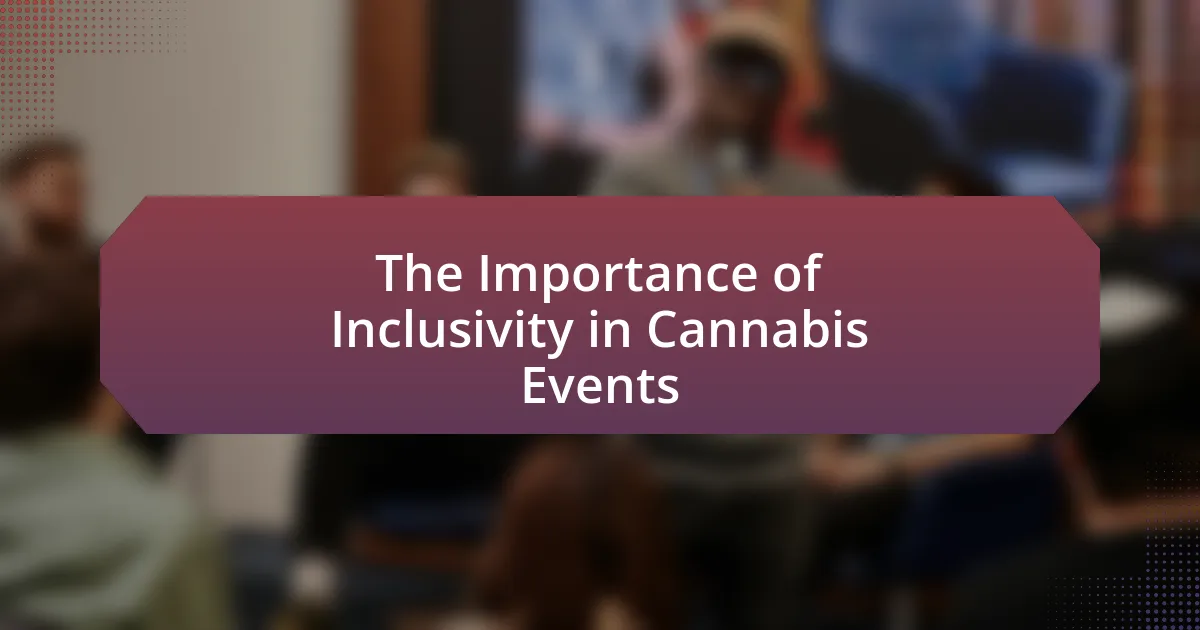The article examines the significant role of cannabis in social justice movements, particularly in addressing racial inequalities and advocating for criminal justice reform. It highlights how the War on Drugs has disproportionately impacted marginalized communities, especially Black and Latino populations, leading to higher arrest and incarceration rates for cannabis-related offenses. Key statistics, such as the finding that Black individuals are 3.64 times more likely to be arrested for cannabis possession than white individuals, underscore systemic disparities in law enforcement. The article also discusses the importance of cannabis legalization as a means to rectify historical injustices, promote economic opportunities, and empower affected communities through equitable access to the legal cannabis market. Additionally, it explores the challenges faced by activists in advocating for reform and the strategies they employ to promote cannabis as a social justice issue.

What is the Role of Cannabis in Social Justice Movements?
Cannabis plays a significant role in social justice movements by highlighting issues of racial inequality and advocating for criminal justice reform. The War on Drugs has disproportionately affected marginalized communities, particularly Black and Latino populations, leading to higher incarceration rates for cannabis-related offenses. For instance, a 2020 report from the American Civil Liberties Union (ACLU) found that Black individuals are 3.64 times more likely to be arrested for cannabis possession than white individuals, despite similar usage rates. This disparity has fueled activism aimed at decriminalizing cannabis and addressing the broader implications of systemic racism in law enforcement and drug policy. Additionally, social justice advocates emphasize the importance of equitable access to the legal cannabis market, ensuring that communities harmed by past drug policies can benefit from legalization and economic opportunities.
How has cannabis been linked to social justice issues?
Cannabis has been linked to social justice issues primarily through its disproportionate impact on marginalized communities, particularly in terms of criminalization and incarceration rates. Historical data shows that despite similar usage rates, Black and Latino individuals are significantly more likely to be arrested for cannabis-related offenses compared to their white counterparts. For instance, a 2020 report from the American Civil Liberties Union (ACLU) indicated that Black individuals are 3.64 times more likely to be arrested for cannabis possession than white individuals, highlighting systemic racial disparities in law enforcement practices. Additionally, the legalization and decriminalization movements for cannabis have often been framed as efforts to rectify these injustices, advocating for expungement of past convictions and equitable access to the cannabis industry for those previously affected by prohibition.
What historical contexts have shaped the relationship between cannabis and social justice?
The relationship between cannabis and social justice has been shaped by historical contexts including the criminalization of cannabis in the early 20th century, the War on Drugs initiated in the 1980s, and the disproportionate impact of drug laws on marginalized communities. The Marihuana Tax Act of 1937 effectively criminalized cannabis, leading to racialized enforcement that targeted communities of color. During the War on Drugs, policies led to mass incarceration, with Black Americans being arrested for cannabis offenses at rates significantly higher than white Americans, despite similar usage rates. According to the American Civil Liberties Union, Black individuals are 3.64 times more likely to be arrested for cannabis possession than white individuals. These historical injustices have fueled social justice movements advocating for cannabis legalization and reforming drug policies to address systemic racism and inequality.
How do cannabis laws disproportionately affect marginalized communities?
Cannabis laws disproportionately affect marginalized communities by perpetuating systemic inequalities and leading to higher rates of arrest and incarceration among these groups. For instance, despite similar usage rates, Black individuals are nearly four times more likely to be arrested for cannabis-related offenses than white individuals, according to the American Civil Liberties Union (ACLU). This disparity highlights how enforcement practices target marginalized populations, exacerbating social and economic disadvantages. Additionally, the criminalization of cannabis has historically contributed to the over-policing of communities of color, resulting in long-term consequences such as loss of employment opportunities and barriers to housing.
Why is cannabis legalization considered a social justice issue?
Cannabis legalization is considered a social justice issue because it addresses the disproportionate impact of drug laws on marginalized communities. Historical data shows that despite similar usage rates, Black and Latino individuals are significantly more likely to be arrested for cannabis-related offenses; for example, a 2020 report from the American Civil Liberties Union indicated that Black individuals are 3.64 times more likely to be arrested for cannabis possession than white individuals. Legalizing cannabis can help rectify these injustices by reducing arrests, expunging criminal records, and allowing for equitable access to the cannabis industry, which can provide economic opportunities for those previously affected by punitive drug policies.
What are the arguments for cannabis legalization in the context of social equity?
Arguments for cannabis legalization in the context of social equity include the rectification of historical injustices, economic opportunities for marginalized communities, and the reduction of incarceration rates. Legalization addresses the disproportionate impact of cannabis prohibition on communities of color, where individuals have faced higher arrest rates despite similar usage patterns compared to white populations. For instance, a 2020 report from the American Civil Liberties Union found that Black individuals are 3.64 times more likely to be arrested for cannabis possession than white individuals, highlighting systemic racial disparities. Furthermore, legalization creates economic opportunities through job creation in the cannabis industry, which can benefit those previously affected by prohibition. States like California have implemented social equity programs that provide resources and support for individuals from communities disproportionately impacted by cannabis laws, aiming to foster inclusive economic growth. Lastly, reducing criminal penalties for cannabis offenses can alleviate the burden on the criminal justice system, allowing for a focus on more serious crimes and reducing the social stigma associated with cannabis use.
How does cannabis legalization impact incarceration rates among minority populations?
Cannabis legalization significantly reduces incarceration rates among minority populations. Studies indicate that states which have legalized cannabis have seen a marked decrease in arrests for cannabis-related offenses, particularly among Black and Hispanic communities, who historically faced disproportionate enforcement of drug laws. For instance, a report from the American Civil Liberties Union (ACLU) found that Black individuals are 3.64 times more likely to be arrested for cannabis possession than white individuals, highlighting systemic racial disparities. Following legalization in states like Colorado and Washington, data showed a decline in these arrest rates, contributing to a broader movement towards social justice and equity in the criminal justice system.
What role do activists play in cannabis-related social justice movements?
Activists play a crucial role in cannabis-related social justice movements by advocating for policy reforms that address the disproportionate impact of cannabis prohibition on marginalized communities. They work to raise awareness about the historical injustices associated with cannabis laws, such as racial disparities in arrests and incarceration rates. For instance, data from the American Civil Liberties Union indicates that Black individuals are nearly four times more likely to be arrested for cannabis possession than white individuals, despite similar usage rates. Activists also engage in grassroots organizing, lobbying for legislative changes, and promoting restorative justice initiatives that aim to rectify past harms caused by cannabis criminalization. Their efforts contribute to a broader dialogue about equity, access, and the need for inclusive policies in the evolving cannabis landscape.
Who are the key figures advocating for cannabis reform and social justice?
Key figures advocating for cannabis reform and social justice include activists like Michelle Alexander, who authored “The New Jim Crow,” highlighting the racial disparities in drug enforcement; Dr. Carl Hart, a neuroscientist advocating for drug policy reform; and organizations such as the Drug Policy Alliance, led by Executive Director Maria McFarland Sánchez-Moreno, which focuses on ending the war on drugs and promoting social equity. These individuals and organizations work to address the injustices associated with cannabis prohibition, emphasizing the need for policy changes that promote equity and justice for marginalized communities affected by past drug laws.
What strategies do activists use to promote cannabis as a social justice issue?
Activists promote cannabis as a social justice issue through strategies such as advocacy for policy reform, community education, and coalition building. They advocate for the decriminalization and legalization of cannabis to address the disproportionate impact of drug laws on marginalized communities, highlighting statistics that show Black individuals are more likely to be arrested for cannabis-related offenses despite similar usage rates compared to white individuals. Community education initiatives aim to inform the public about the historical context of cannabis prohibition and its ties to systemic racism, fostering a deeper understanding of the issue. Additionally, coalition building with other social justice movements amplifies their message, creating a unified front that emphasizes the intersectionality of cannabis reform with broader civil rights issues.
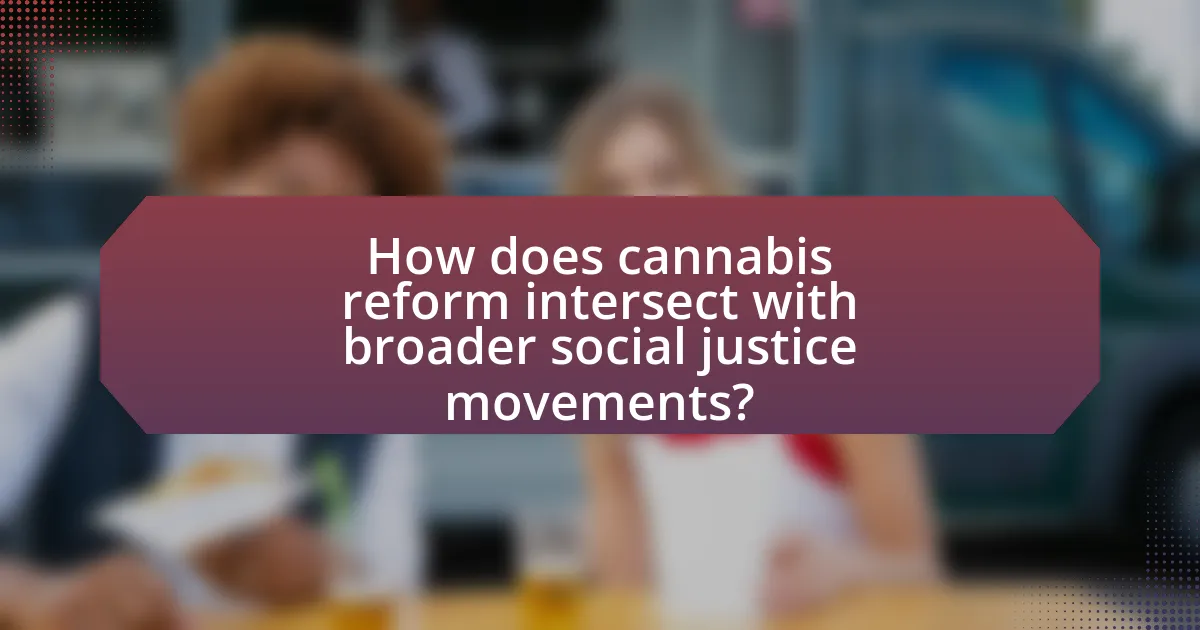
How does cannabis reform intersect with broader social justice movements?
Cannabis reform intersects with broader social justice movements by addressing systemic inequalities and the disproportionate impact of drug enforcement on marginalized communities. Historical data shows that Black individuals are nearly four times more likely to be arrested for cannabis-related offenses than white individuals, despite similar usage rates. This disparity highlights the need for reform to rectify injustices and promote equity in legal frameworks. Additionally, cannabis legalization efforts often include provisions for expunging past convictions, which directly benefits those adversely affected by previous laws. By integrating social equity measures into cannabis legislation, reform advocates aim to create opportunities for economic participation and community reinvestment, further aligning cannabis reform with the goals of social justice movements.
What connections exist between cannabis reform and racial justice movements?
Cannabis reform is closely connected to racial justice movements due to the disproportionate impact of cannabis prohibition on communities of color. Historical data shows that despite similar usage rates, Black individuals are arrested for cannabis-related offenses at nearly four times the rate of white individuals in the United States. This systemic inequality has fueled calls for reform, as advocates argue that legalizing cannabis can help rectify past injustices and reduce the criminalization of marginalized communities. Furthermore, many racial justice movements emphasize the need for equitable access to the legal cannabis market, ensuring that those most affected by prohibition can benefit from its legalization.
How have racial justice organizations incorporated cannabis reform into their agendas?
Racial justice organizations have incorporated cannabis reform into their agendas by advocating for the decriminalization and legalization of cannabis as a means to address systemic racial disparities in drug enforcement. These organizations highlight the disproportionate impact of cannabis prohibition on communities of color, evidenced by statistics showing that Black individuals are nearly four times more likely to be arrested for cannabis-related offenses than white individuals, despite similar usage rates. By pushing for policy changes, these organizations aim to rectify past injustices, promote economic opportunities through legal cannabis markets, and ensure equitable access to the benefits of cannabis legalization.
What impact does cannabis reform have on community empowerment and activism?
Cannabis reform significantly enhances community empowerment and activism by providing marginalized groups with opportunities for economic development and social justice advocacy. Legalization and decriminalization efforts often lead to the establishment of local cannabis businesses, which can create jobs and generate tax revenue that supports community programs. For instance, states like Colorado have reported over $1 billion in tax revenue from cannabis sales, which has been allocated to education and public health initiatives, directly benefiting local communities. Furthermore, cannabis reform initiatives often involve grassroots movements that mobilize community members to advocate for policy changes, fostering a sense of agency and collective action. This activism not only addresses the historical injustices associated with cannabis prohibition but also empowers communities to engage in broader social justice issues, as seen in organizations like the Last Prisoner Project, which advocates for the release of individuals incarcerated for cannabis-related offenses.
How does cannabis policy reform address economic disparities?
Cannabis policy reform addresses economic disparities by creating equitable access to the cannabis industry for marginalized communities. This reform often includes provisions for expunging past cannabis-related convictions, which disproportionately affect low-income individuals and people of color, thereby allowing them to participate in the legal market. For instance, states like California have implemented social equity programs that provide financial assistance and training to individuals from communities historically impacted by cannabis prohibition. According to a report by the Drug Policy Alliance, these initiatives can lead to increased economic opportunities and job creation in underserved areas, helping to reduce the wealth gap.
What opportunities does the cannabis industry create for marginalized communities?
The cannabis industry creates economic opportunities for marginalized communities through job creation, entrepreneurship, and access to capital. As legalization expands, these communities can participate in cultivation, distribution, and retail, which historically have been inaccessible due to systemic barriers. For instance, a report by the National Cannabis Industry Association indicates that minority-owned cannabis businesses are growing, with a significant increase in licenses awarded to individuals from marginalized backgrounds. Additionally, social equity programs in various states aim to provide financial assistance and training to those affected by past cannabis prohibition, further enabling their participation in the industry.
How can equitable cannabis policies promote economic justice?
Equitable cannabis policies can promote economic justice by ensuring fair access to the cannabis industry for marginalized communities. These policies can include measures such as expunging criminal records for past cannabis offenses, which allows individuals to participate in the legal market without the burden of a criminal history. For instance, states like California have implemented social equity programs that provide financial assistance and training to individuals from communities disproportionately affected by cannabis prohibition, leading to increased business ownership and job creation in those areas. Additionally, equitable taxation of cannabis sales can generate revenue that can be reinvested into these communities, further supporting economic development and addressing historical inequalities.
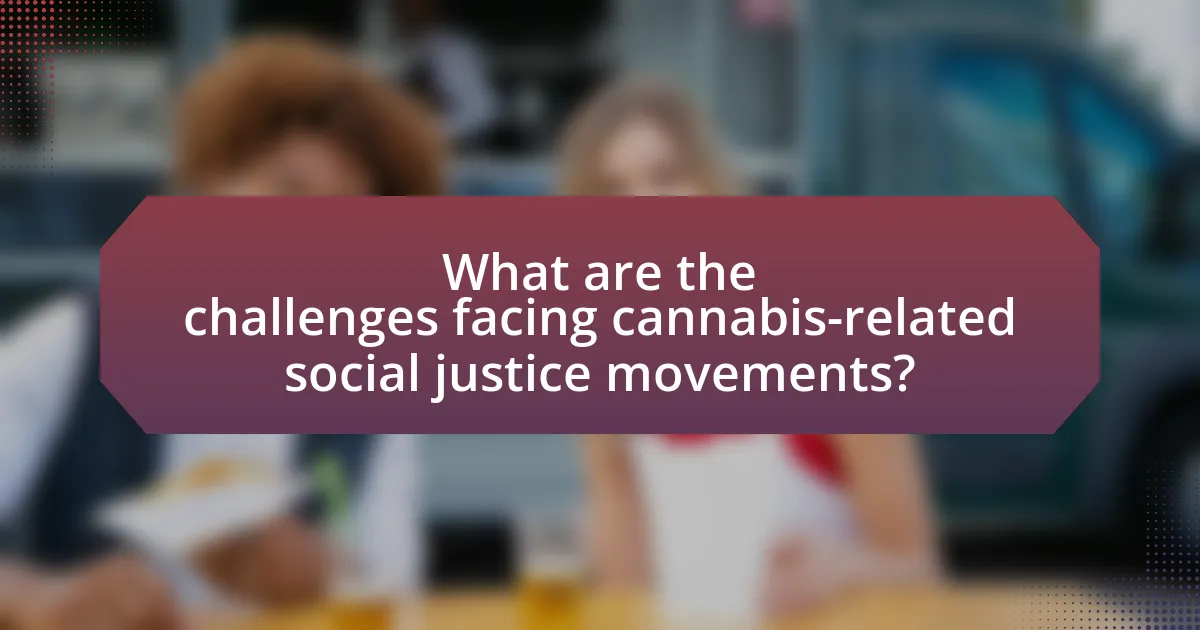
What are the challenges facing cannabis-related social justice movements?
Cannabis-related social justice movements face several significant challenges, including legal barriers, stigma, and economic disparities. Legal barriers arise from the ongoing criminalization of cannabis in many jurisdictions, which complicates efforts to advocate for reform and justice for those disproportionately affected by past drug policies. Stigma surrounding cannabis use continues to hinder public support for social justice initiatives, as negative perceptions can influence policy decisions and community engagement. Economic disparities also play a critical role, as marginalized communities often lack access to the resources necessary to participate in the legal cannabis market, perpetuating cycles of inequality. These challenges collectively impede the progress of social justice movements aimed at addressing the historical injustices associated with cannabis prohibition.
What obstacles do activists encounter in advocating for cannabis reform?
Activists encounter significant legal, social, and political obstacles in advocating for cannabis reform. Legal challenges include existing federal and state laws that criminalize cannabis use, creating a hostile environment for reform efforts. Social stigma surrounding cannabis persists, often leading to public opposition and hindering dialogue about its benefits. Politically, activists face resistance from lawmakers who may be influenced by lobbying from the pharmaceutical and alcohol industries, which view cannabis reform as a threat to their profits. These obstacles collectively impede progress toward comprehensive cannabis reform, as evidenced by the slow pace of legislative changes in many jurisdictions despite growing public support.
How do political and legal barriers hinder progress in cannabis social justice initiatives?
Political and legal barriers significantly hinder progress in cannabis social justice initiatives by maintaining outdated laws and regulations that perpetuate systemic inequalities. For instance, federal prohibition of cannabis in the United States continues to criminalize individuals for possession and use, disproportionately affecting marginalized communities. Additionally, state-level regulations often lack provisions for expunging past cannabis-related convictions, which further entrenches social disparities. According to a 2021 report by the American Civil Liberties Union, Black individuals are nearly four times more likely to be arrested for cannabis possession than white individuals, illustrating how these barriers exacerbate racial injustices. Furthermore, the lack of political will to reform cannabis laws limits funding and resources for social justice programs aimed at addressing the harms caused by previous cannabis criminalization.
What role does stigma play in the fight for cannabis-related social justice?
Stigma significantly hinders the fight for cannabis-related social justice by perpetuating negative perceptions and discrimination against individuals associated with cannabis use. This stigma often results in legal penalties, social exclusion, and economic disadvantages for marginalized communities disproportionately affected by cannabis prohibition. For instance, a report from the American Civil Liberties Union (ACLU) highlights that Black individuals are nearly four times more likely to be arrested for cannabis possession than white individuals, despite similar usage rates. This disparity illustrates how stigma not only shapes public opinion but also informs policy and enforcement practices, ultimately obstructing efforts to achieve equity and justice in cannabis legislation.
How can communities overcome challenges in cannabis advocacy?
Communities can overcome challenges in cannabis advocacy by fostering education and awareness about the benefits and legalities of cannabis use. By organizing workshops, seminars, and community discussions, they can dispel myths and provide accurate information, which is crucial for changing public perception. For instance, a study by the American Civil Liberties Union found that states with legal cannabis have seen a significant reduction in racial disparities in arrests, highlighting the social justice aspect of cannabis reform. Additionally, forming coalitions with other advocacy groups can amplify their voice and resources, creating a united front that is more effective in lobbying for policy changes.
What best practices can activists adopt to enhance their effectiveness?
Activists can enhance their effectiveness by employing strategic communication, building coalitions, and utilizing data-driven approaches. Strategic communication ensures that messages resonate with target audiences, increasing engagement and support. For instance, campaigns that effectively use social media platforms have shown a 50% increase in outreach compared to traditional methods. Building coalitions with other organizations amplifies resources and influence, as seen in the collaboration between cannabis reform groups and broader social justice movements, which has led to significant legislative changes. Utilizing data-driven approaches allows activists to measure impact and adjust strategies accordingly; research indicates that organizations using analytics in their campaigns see a 30% improvement in goal achievement.
How can community engagement improve the outcomes of cannabis reform efforts?
Community engagement can significantly improve the outcomes of cannabis reform efforts by fostering inclusive dialogue and ensuring that the voices of affected communities are heard. Engaging local stakeholders, including those disproportionately impacted by cannabis prohibition, leads to more equitable policies that address specific community needs. For instance, research from the Drug Policy Alliance highlights that jurisdictions with strong community involvement in cannabis policy development tend to implement more effective and just regulations, resulting in reduced disparities in enforcement and access to legal cannabis. This engagement not only builds trust between policymakers and communities but also enhances the legitimacy and acceptance of reform initiatives.
What practical steps can individuals take to support cannabis social justice movements?
Individuals can support cannabis social justice movements by actively participating in advocacy efforts, such as contacting legislators to promote equitable cannabis policies. Engaging in community education about the impacts of cannabis prohibition on marginalized groups is also crucial, as it raises awareness and fosters informed discussions. Additionally, donating to organizations that focus on cannabis equity, such as the Last Prisoner Project, which works to free those incarcerated for cannabis-related offenses, directly contributes to social justice initiatives. Supporting local businesses owned by individuals from communities disproportionately affected by cannabis laws further strengthens economic equity. According to a report by the ACLU, Black individuals are nearly four times more likely to be arrested for cannabis possession than white individuals, highlighting the need for targeted support in these movements.
